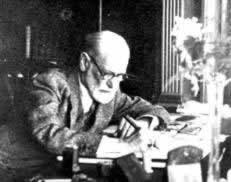![]()
The Sphinx of Modern Literature
| Within the past few years the analytic investigation of the workings of genius has been infused with fresh interest by the luminous studies of Freud, who has revealed some of the fundamental mechanisms by which artistic and poetic creativeness proceeds. - Ernest Jones, Hamlet and Oedipus, W.W.Norton, N.Y. 1976. p.14. |
 |
Ernest Jones essay "The Oedipus Complex as an Explanation of Hamlet"s Mystery" was first published in The American Journal of Psychology in January of 1910. It was published in German the following year as a monogram, and then revised and expanded in 1923 when it appeared under the title "A Psycho-Analytic Study of Hamlet" as the first chapter in Jones' book, Essays in Applied Psycho-Analysis. It was further revised and extended into Jones' Hamlet and Oedipus (1949), a book which was almost immediately taken to be the expression of the official Freudian position on Hamlet, largely due to Jones' closeness to Freud himself, both as a disciple and as his official biographer.
Jones begins by emphasizing the revolutionary energy that was infused into psychology by the thinking of Sigmund Freud and his disciples, but it soon becomes apparent that these changes were firmly built on the foundation of the Romantic revolution a century before the popularization of Freud's work. Like the Romantics, Jones takes as a starting point that the audience for a dramatic work should relate to the characters on stage as if they were real people, and not simply fictitious creations
| No dramatic criticism of the personae in a play is possible except under the pretense that they are living people, and surely one is well aware of this pretense. - Jones. p.18. |
More importantly, Sigmund Freud (and Ernest Jones) accepted the Romantic
assumption as a starting point that the major interest in the character
of Hamlet is the reason for his seeming delay. Finding this reason became
the principle focus of Freudian criticism of Hamlet. It was as if
Freud felt that a cause had to be isolated for this behavior (or lack of
it) even if it was too late effect a cure. Freud referred to the matter
as the "Problem of Hamlet"; as if it were the only major critical
question that mattered. (More.)
| It should be pointed out, however, that the bulk of this material [psychoanalytic criticism] is devoted to what we call with impunity, The Problem -- namely, why does Hamlet hesitate to kill the King? -- and that in this regard it contributes to a current of criticism that psychoanalysis did not originate but which psychoanalysis profoundly affected. Nor can we fail to underscore for a second time that it was in attempting to answer the problem of Hamlet's procrastination that the psychoanalytic school of Shakespearean criticism originated. - M.D. Farber, The Design Within: Psychoanalytic Approaches to Shakespeare, Science House, N.Y. 1970. p. 79. |
Sigmund Freud, himself, had this intention in mind in his studies of Hamlet. He wanted to be remembered as the psychological detective who found the solution to "The Problem."
| The play is built up on Hamlet's hesitations over fulfilling the task of revenge that is assigned to him; but its text offers no reasons or motives for these hesitations and an immense variety of attempts at interpreting them have failed to produce a result. According to the view which was originated by Goethe and is still the prevailing one today, Hamlet represents the type of man whose power of direct action is paralyzed by and excessive development of his intellect. - Sigmund Freud, The Interpretation of Dreams, tr. James Strachey, Avon, N.Y. 1965. p.298. |
What Jones did was focus yet further on what he considered to be the essential mystery behind Shakespeare's work.
|
Dover Wilson gives as his opinion that the understanding of Shakespeare's
"Hamlet" is the greatest of all literary problems... |